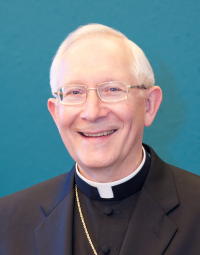
Archbishop Leonard P. Blair
For a person dedicated to their religious faith, whether Catholic or not, today’s decline in religious self-identification and practice presents a great challenge. In the United States, when asked in 2018 about their religious affiliation, 23.7 percent of respondents answered “none,” compared to only 5.1 percent who answered “none” in 1972.
In a new book, Professor Ryan P. Bunge opines that when it comes to Christianity, “… Americans used to be Christian by default, not because of their belief in the words of the Apostles’ Creed. Secularization merely gave permission for a lot of people to express who they truly are, that is, religiously unaffiliated. ”In other words, Bunge is suggesting that for many people in the past religious faith was more about ethnicity, family, neighborhood and community than it was about personal belief.
So, if you were part of a close-knit ethnic religious family and neighborhood, for example, you identified as religious, whether you believed and practiced what your church taught or not. But nowadays, Bunge points out, fewer people are still feeling the need to identify themselves as religious when they don’t really practice their religion or accept all its beliefs. More and more, the answer they give to religious affiliation is “none. ”If we who are Catholic think of ourselves as links in a chain of faith going back through the centuries (to use an image from St. John Henry Newman), then we have to acknowledge that that chain of Catholicism, whether only nominal or deeply held, is being broken. It doesn’t mean that the so-called “nones” are totally lost to us.
Many remain favorably disposed, though not all, but the faith is no longer being handed down and practiced as it once was. The decline in religious identity and practice is not without consequences. Recently (July 29, 2021), New York Times columnist David Brooks wrote about what he called “the psychological unraveling of America.” The result, Brooks points out, is a major increase in depression rates among teenagers, in suicide rates, in the isolation of people who claim to have no close friends. “Social pain and vulnerability are affecting everything,” he writes, “our families, schools, politics and even our sports.” Brooks says that he “doesn’t know what’s causing this.” I, on the other hand, believe the crisis he describes is due in a very significant way to America’s religious “unraveling.”
Pope Francis speaks of our modern world’s “moral, spiritual and material destitution … pervaded by consumerism … the desolation and anguish born of a complacent yet covetous heart, the feverish pursuit of frivolous pleasures, and a blunted conscience.” This is the picture of a world increasingly distanced from religious faith and practice. In 1831, the Frenchman Alexis de Tocqueville, in his book Democracy in America, emphasized the importance of religion in American society. Religion, he said, taught virtuous behavior, which is essential if liberty is to be ordered to the common good. By bringing a moral dimension to issues, religion also helped ensure that majority rule not deteriorate into an immoral tyranny. Religion also creates an allegiance and devotion among its adherents that counteract the tendency of government to swallow up all aspects of life. Today, we are more and more experiencing the bitter consequences that come, in part, from a loss of religious adherence and practice on the part of a growing number of Americans.
The rise of the “nones” is not good news for their own well-being or that of our country and world. This is not to say that religious people are always free of hypocrisy, social injustices and other sins, but they are constrained by a set of beliefs and a community of belief that promotes virtue and censures vice. Our challenge as Catholics is to counter today’s trend with the power of the Gospel, which always packs a punch because it is God’s word and carries with it the power of the Holy Spirit. But we must do so with conviction and without fear of being “out of step” with the prevailing culture. We have to speak out and stand up with courage, as Christ told us. Perhaps the first step is to ask ourselves honestly: Are we part of the problem or part of the solution?
